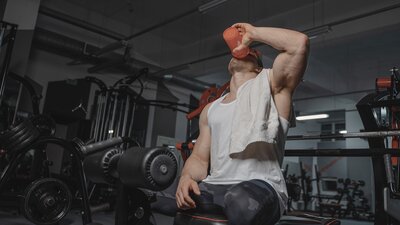Your body has to balance between creating and breaking down muscle tissue. When you eat protein and weight train, your body produces new proteins. When you rest and digest your food, your body breaks down and removes damaged proteins. The overall ratio of this daily cycle determines your overall muscle growth. Here is everything that you need to know about resistance training and eating protein to stimulate maximum muscle growth.
Protein Dose: How Much Protein Should I Eat?
There is a lot of debate about how much protein you should eat. Here is what the science says:
According to a 2009 study by Moore et al, (1) people only needed around 20 gram of protein per meal for near maximal protein synthesis; (2) eating between 20 grams and 40 grams of protein provides only a marginal increase; and (3) eating more than 40 gram of protein provides little to no increase in protein production. In a 2015 follow-up study by Moore et al, they found that the optimal protein consumption is 0.4g per kg (0.18g per lb) of body weight per meal with four servings throughout the day. Example: If you weigh 77 kilograms / 170 pounds, you would need around 31g of protein per meal or 124g per day.
Protein Timing: When Should I Eat Protein?
Eating an adequate amount of protein within 24 hours after a workout is more important than the actual timing of your intake. However, if you want to further optimize muscle growth, here are three scientific tips: (1) you should eat protein as soon as possible after working out but don’t worry the anabolic window does close for 24 hours; (2) eating 20g of protein every 3 hours is better than 10g every 90 minutes and better than 40g of protein every 6 hours; (3) consuming 40g of slow digesting casein protein before sleeping will limit the amount of protein breakdown and increase your overall muscle growth.
Protein Source: Which Protein Supplement Should I Choose?
The source of protein does not matter as much as the total amount of protein consumed. The main sources of dietary protein supplements are milked based products like whey or casein and plant based products like soy and pea protein. Whey is the gold standard of protein supplements because it is easily absorbable, quickly digested, and produces a strong effect on protein synthesis. The rationale behind its effectiveness is the presence of leucine which has the biggest impact on protein synthesis and muscle growth. Casein is another great protein supplement because of its slower digestive properties which inhibits muscular breakdown especially at night. Both soy and pea proteins are very good protein sources but have been shown to be less effective than whey because of the lower leucine content.
Should I Eat Carbs with My Protein?
For the purpose of maximizing your muscle growth through protein synthesis, you don’t need to eat carbohydrates with your protein because carbs will not increase protein production. However, post workout carbs can be very beneficial for your post workout recovery because it will increase insulin production, stimulate blood flow, and replenish your glycogen levels.
References

